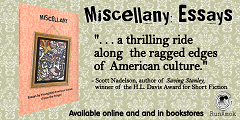On Teaching
I continue to find new reasons to do what I do.
Without returning to the question of why I teach, my profession would turn into a static transmission of knowledge: I would become a textbook, not a person.
A student just last week confessed that he imagined teaching as this repetitive exercise, a dolling out of the same rehearsed knowledge every year.
It sparked a good discussion.
I told him that every year is wildly different because of the students. And the more I teach, the less I focus on the content. It’s not about what the teacher knows, anyway. It’s about what his students know. That is where learning starts: a teacher must learn what a student knows. What comes next is the teacher’s enticing them to learn more. Any success in the classroom, in my opinion, is a byproduct of those two steps.
Teaching, when framed this way, becomes more exciting every year, not less. The more the content cements in my own understanding, the more I can focus on setting wet concrete in the minds of my students.
Coming to this long view took time, and a lot of trial and error.
But it was a natural process.
It would be an exercise in madness to teach the same content year after year if transferring content was my only purpose. Still, a teacher has to start somewhere. And I definitely started with content.
In my first-year teaching, my motor ran on memories of how classes were for me in high school. Multiple choice tests. Memorization of plots and characters. I wanted to deliver for my students what I thought an education was. I saw key moments in books that I loved as culminating classroom experiences; when, after slogging through a text, we could finally share a common insight into passages containing deep symbolism and revelation.
Over time, though, content pursuit dries up the fun of teaching. And it didn’t take me long to realize that when I have fun instructing, students have fun learning. More important than me finding ways to enjoy the content each year was finding them ways to enjoy the content each year. And as each year holds new students, there is no end to the joy of teaching.
I’ve had a lot of help along the way. It’s no secret that I walk in the footsteps of giants at my school. The English department has its share of legendary figures; many are still teaching today after decades of improving their craft.
I’ve been supported in my journey to reinvent myself as a teacher each year. That journey is openly shared in my department. One experience, in particular, helped me shape my trajectory in the classroom.
Once an occurrence; twice a coincidence; three times a pattern.
This is why the power of three is so important in literature (and in spiritual matters, and life matters, of course).
In one year, I met three former students of a retired colleague. Each student, now a grown man, shared that this teacher inspired a lifelong love of reading the classics. How cool is that? It became my main driving force: foster readers.
I can’t foster readers if I treat each text like a treasure map where X marks the A+. Instead of handing them a map to the text, I have to teach them how to navigate. This means that they are free to discover their own treasure. And I hope it entices them to continue the journey long after the ink dries on their final grade.
This is no easy task because what most students care about is what that final grade will read and how it will sound when exiting the mouths of their parents. One flaw of the grading system is how it objectifies the learning process. Reconciling their desire for the best grade possible and my desire to make lifelong readers out of them is a messy process. But the good part is that process is a creative one that is really fun to tinker with. And, as a new pack of students walks the hall each year, the salt never loses its savor.
I’ll never care as much about their grades as they do, but I can use their concern for their grades to enforce the sort of habits that foster self-awareness, curiosity, insightfulness, independence and self-esteem. And then, hopefully, one day when they become self-aware, curious, insightful, independent and confident people, they continue to practice what made them that way. They continue to read for themselves. And not only books, but people, circumstances, emotions. They may even learn how to better read themselves. “Everything is a text,” as my mentor, principal, and colleague tells his class.
I don’t know how well my experiments in the classroom have been paying off, but I did recently have some evidence that something is working. A student who works as a server at the restaurant nearby our school stopped me the other day.
“Mr. Goodson!”
What ensued is that awkward dance of student-teacher reunion. Students somehow think that, after not seeing them for a decade, I will assume to know them like I did when they were a wide-eyed, pimply-faced teenager.
“Do you remember my name?”
I had to apologize that, while I remembered his face, his name was escaping me.
“I recited Ophelia’s lines in class, remember? Remember Hamlet?”
The memory did, then, come flooding back.
And while I didn’t remember his name, he remembered Ophelia’s. We shared a recollection of a single 30-second span in the classroom. Somewhere, in his map of adolescence, X marked a Shakespeare play.
What a treasure.
It’s good that my profession forces me to wait a decade to know the fruits of my labor.
As anyone in long term recovery can tell you, people who suffer from addiction need to find pursuits that aren’t tied to immediate gratification. For anything that can so instantly change how I feel will hook me. And those types of fixes don’t end well.
Much healthier for me is the lifelong puzzle of my avocation: why do I continue to teach?
 Previous Post
Previous Post












Mark – Loved this commentary – I think I would have enjoyed your class, and I am happy that you are a teacher, certain that you impact the lives of many of your students in a positive way – all the best! MOD